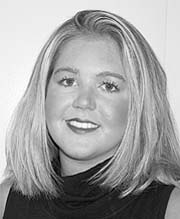
Sixth district police ride
For those of us who lead our lives in the confines of Dallas/Highland Park/SMU it is hard to believe that a world harsher than TVs toughest cop drama’s exists. It does. For my final Washington assignment, I went on a police ride-along in D.C.’s sixth district, otherwise referred to as the No. 1 homicide and drug community in the nation. I spent two hours of my life on patrol beside Officer J.L. Mitchelle. The experience opened my eyes to everything I’ve taken for granted in life. The way these children and adults live frightened me, but for them it is a way of life. The following article is a recap of my experience in D.C.’s sixth. I hope what you read opens your eyes as wide as the ride opened mine.
In the place where northeast D.C. meets the southeast side, it’s impossible to tell who’s running the streets. The citizens of the sixth district live in the nation’s most dangerous community. Criminals run from the scene, kids run drugs, addicts run for a fix and prostitutes ruin lives. Here drugs, crime, sex and HIV are more prevalent than bait and beer in a small west Texas town.
For those who reside here, life is about survival. Very few are clean and clean-up seems impossible. But Mitchelle and the rest of the sixth district force feel their spotlights might un-mask crime to justice.
“Half of these kids can’t read or write.” For Mitchelle the harsh reality of the sixth serves as an alibi for the citizens living here. “I try treating them like human beings. I don’t do anything that I wouldn’t want somebody doing to me.”
Most people here fight … they fight for freedom and for their lives. The citizens of this community defy the principals of modern civilization. The sixth district is overrun with poverty, but the citizens refuse to acknowledge defeat.
“They have all been dogged so bad they take the law into their own hands,” Mitchelle said admitting he can’t really blame them.
Justice and fairness are not a part of these citizens’ vocabulary. These individuals are victims of stereotypes and welfare. They are part of an unfair cycle and escaping is next to impossible.
“Is it fair, no … is it the way the world goes … yes,” Mitchelle said trying to justify the paths these citizens take. “Here it’s survival.”
In the sixth district HIV flows freer than water and drug deals are super sized. East Capital divides the prostitutes from the dealers. For the cops who ride the streets it isn’t about who does right or wrong. Justice comes when they save and redirect people’s lives.
In other parts of the nation a scene like this would call for backup and weapons, but in the shadows of the sixth the cops just make sure the deal doesn’t go bad.
“We let the narcs work with that stuff because they can make [a] big bust,” Mitchelle said as he cruised by the scene. “For us it ain’t worth it. It isn’t worth me getting shot over a little bit of marijuana.”
Every day the officers of the sixth district place their life on the line to protect the public. And in the sixth the line that they lay on is wider and more visible than in most towns in the United States.
“Here they get paid to kill the cops,” Mitchelle said approaching a stoplight cautiously looking left, right, in front and behind. “For $1,500 they’ll put a nice bullet in your head and they’ll have no remorse at all, but you have to be a real asshole [cop] for them to do it.”
With seven years of experience, three of them in the sixth, Mitchelle knows the danger he faces. But with his experience, he has developed wisdom and learned tricks that the general public think only happen on TV.
“They may get me, but I’m not going by myself,” Mitchelle said of his secret to survival. “I don’t trust anyone. I pull [my gun] out a lot because they think they are invisible. They think because they are six foot tall they are going to get me and that they aren’t going to get shot, but I am not going to let them win.”
The district compensates the danger by paying the cops $80-90,000 a year, but for the men patrolling the streets, the reality of life comes at a higher price.
“As an officer you’re not going to have your rights,” Mitchelle said shaking his head. “But the criminals will.”
In the sixth no one wins, but the blue suits try to keep the innocent from losing. In this community, it isn’t about cleaning the streets, instead it’s about throwing out the clutter and protecting the valuables.
“Those kids right there go jogging every night at this time, they are No. 3 in the state for track,” Mitchelle said smiling. “The other kids harass them because they don’t do drugs. We try to watch out for them because they want to go somewhere in life.”
Although the grasp of the demons holds most in this neighborhood back, there are a few who make it to the promised land. For Mitchelle, the possibility of escorting a few from darkness keeps him patrolling the streets.
“I wouldn’t go to another district here because there are still a lot of good people here that need to be protected,” Mitchelle said explaining why he places his own life in jeopardy for the community. “I got onto the force to make a difference. I’ll admit I’m getting burnt out, but here it’s gotten better … but you know … I don’t know if we’ll ever win.”








